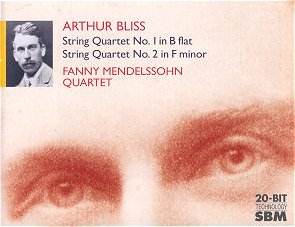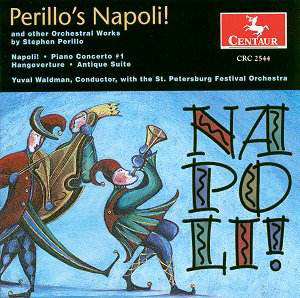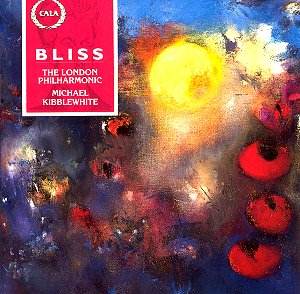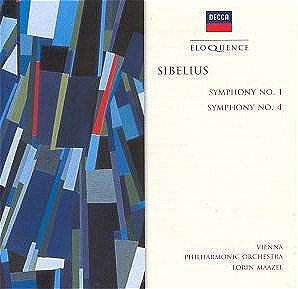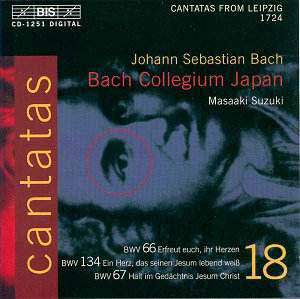 Composer: Johann Sebastian Bach
Composer: Johann Sebastian Bach
Works: Cantata No. 66, “Erfreut euch, ihr Herzen”, BWV 66; Cantata No. 134, “Ein Herz, das seinen Jesum lebend weiß”, BWV 134; Cantata No. 67, “Halt im Gedächtnis Jesum Christ”, BWV 67
Performers: Robin Blaze, alto; Makoto Sakurada, tenor; Peter Kooij, bass; Bach Collegium Japan; Masaaki Suzuki, conductor
Recording: May 2001, Kobe Shoin Women’s University, Japan
Label: BIS
With the unfolding of Bach’s sacred cantatas, we witness a fervent exploration of theological and emotional depths that echo through the corridors of music history. Volume 18 of Masaaki Suzuki’s ambitious project presents three cantatas composed during Bach’s Leipzig years, specifically in April 1724. Each work reveals Bach’s profound ability to intertwine text and music in a manner that resonates with both liturgical significance and personal reflection. This recording stands as a testament to Suzuki’s commitment to illuminate the unique character of each cantata while fostering an engaging listening experience.
The first cantata, BWV 66, “Erfreut euch, ihr Herzen,” bursts forth with exuberance, capturing the essence of joy that permeates Bach’s sacred oeuvre. The opening chorus, characterized by its buoyant rhythms and intricate counterpoint, is a resplendent celebration. However, the inclusion of the trumpet in this movement introduces a thorny issue. While the trumpet’s role is to elevate the joyous atmosphere, its occasional intonation issues, especially in the faster passages, detract from the overall brilliance of the performance. Suzuki’s decision to retain this optional instrument could have benefitted from a more judicious approach, perhaps akin to Philippe Herreweghe’s more subdued interpretation. Nonetheless, Robin Blaze’s expressive alto shines, particularly in the duet sections, where her nuanced phrasing and dynamic control complement Peter Kooij’s robust bass, creating a rich tapestry of vocal color.
Moving on to BWV 134, “Ein Herz, das seinen Jesum lebend weiß,” the cantata unfolds with a contemplative grace, particularly in the duet “Wir danken und preisen dein brünstiges Lieben.” Here, Blaze and tenor Makoto Sakurada engage in a lyrical dialogue that recalls the elegant instrumental dialogues of Bach’s Brandenburg Concertos. The interplay between voice and orchestra is masterfully executed, with both singers and instrumentalists achieving a balance that highlights the text’s emotional depth. The orchestral support is not merely accompaniment but an integral part of the musical narrative, further underscoring Bach’s sophisticated orchestration.
BWV 67, while shorter and less complex than its predecessors, still contains moments of striking beauty. The aria “Friede sei mit euch!” features a compelling dialogue between Kooij’s firm bass and the chorus, encapsulating the cantata’s meditative spirit. Though the brevity of this work may leave some yearning for more elaborate developments, Kooij’s interpretation brings a gravitas that resonates deeply. The clarity of the Bach Collegium Japan’s ensemble work maintains a high standard throughout, showcasing the ensemble’s cohesiveness under Suzuki’s direction.
The recording quality merits commendation, with BIS consistently delivering a sound that is both crisp and immersive. The engineering captures the subtle nuances of the instrumental interplay and the vocal lines, allowing each voice to be distinct yet harmoniously integrated within the ensemble. However, a minor caveat arises regarding the printed notes; the diminutive type size may prove challenging for some listeners, even as the scholarly content remains valuable.
With this volume, Suzuki continues to solidify his reputation as a leading interpreter of Bach’s cantatas. Despite the minor setback with the trumpet in BWV 66, the performances are imbued with a scholarly attention to detail and an emotional sincerity that brings these works to life. Each singer shines brightly, contributing to a rich interpretation that will satisfy both seasoned Bach aficionados and newcomers alike. This recording stands as another gem in an already illustrious series, offering insight into Bach’s genius while inviting listeners to partake in the celebration of his sacred music.
